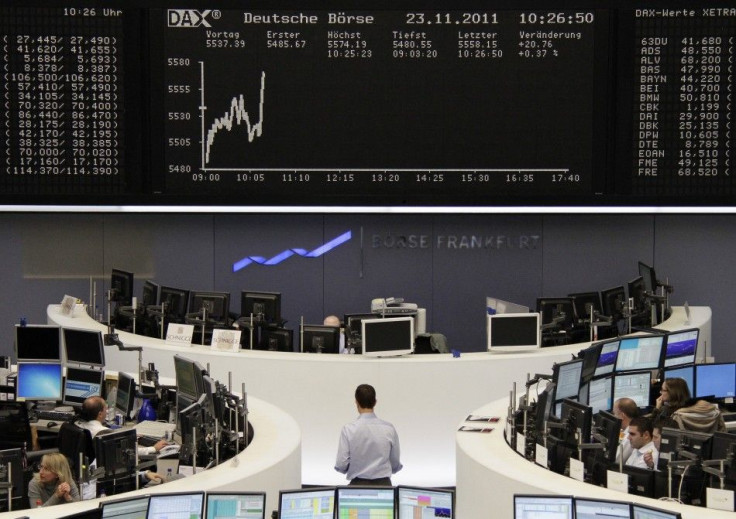Europe's Markets Rally Friday at Mid-Day on EU Agreement to Tighten Budget Rules

(REUTERS) - European stocks were up around midday on Friday in a roller coaster session, with a key index bouncing between major technical levels following an agreement by European leaders for tighter Eurozone budget rules.
Stocks increased their gains, led by banks and insurers, after a source told Reuters China's central bank plans to create a new vehicle to manage two investment funds worth a total of $300 billion, one targeting investments in the U.S. and the other focused on Europe.
At 1245 GMT, the FTSEurofirst 300 index of top European shares was up one percent at 983.39 points in relatively low volumes, reversing a three-session drop.
London's FTSE 100 was up 16 points to 5,500, Germany's DAX rose 70 points to 5,944 and France's CAC 40 rose 42 points to 3,137.
The Eurozone's blue chip Euro STOXX 50 index was up 1.8 percent at 2,328.06 points, but gains were capped as the index struggled to break above a key resistance level, the 23.6 percent Fibonacci retracement level of its rally from late November to this week's peak.
Earlier in the session, that index drifted into negative territory and tested its 50-day moving average, a major support level, before bouncing back.
The bounce between the two key technical levels showed investors' mixed reaction to news coming out of the EU summit.
NO SILVER BULLET
All 17 Eurozone countries and six others that aspire to join the currency bloc resolved to negotiate a new agreement alongside the EU treaty, with a tougher deficit and debt regime.
But the fact that Britain was left out of the deal and the lack of progress on immediate measures to ease pressure on government bond markets prompted a number of investors to doubt Friday's rally would last.
From what we have seen so far, this summit hasn't produced a silver bullet, said Gary Jenkins Head of Fixed Income at Evolution Securities.
Banking stocks featured among the top gainers, with Intesa SanPaolo up 6.4 percent, Deutsche Bank up 4.9 percent and Natixis up 4.7 percent, reversing most of the losses suffered earlier in the week.
Insurers also gained ground, with Allianz up 2.7 percent and AXA up 1.8 percent.
We have another euro agreement but one that misses the point, said Trevor Greetham, director of asset allocation at Fidelity Worldwide Investment.
NO INFLOWS DESPITE RALLY
There are probably only two stable equilibria, full political union or break up. With neither imminent, I'd say volatility is here to stay ... What we would need to see to end the crisis once and for all is full burden sharing -- with clear and unconditional ECB support the first step, he said.
Renewed investor appetite for European stocks was dampened on Thursday by ECB President Mario Draghi who poured cold water on hopes the central bank would step up bond purchases, seen as key to stabilize the borrowing costs of troubled Eurozone countries.
According to data from EPFR Global, which tracks fund flows and asset allocation data, investors have been cutting their overall equity exposure to the Eurozone throughout the fourth quarter, and flows have remained negative despite the strong stock market rally started in late November.
Daily flow data during the fourth quarter suggests investors are losing patience with the Eurozone's inability to contain its long running crisis, EPFR said in a note.
HUNT FOR YIELD STILL IN VOGUE
However, the picture is different at Source, a major provider of European exchange-traded funds (ETF). It's seeing overall inflows into ETFs so far in December as investors seem to have been playing the recent rally through ETFs instead of by directly buying stocks, a sign the rally remains fragile.
The systemic risk is fading, but the environment remains tough. The 'hunt for yield' will remain in vogue next year, said Jean-Marie Mercadal, head of management at OFI Asset Management, which has 47 billion euros ($63 billion) under management.
© Copyright Thomson Reuters {{Year}}. All rights reserved.





















